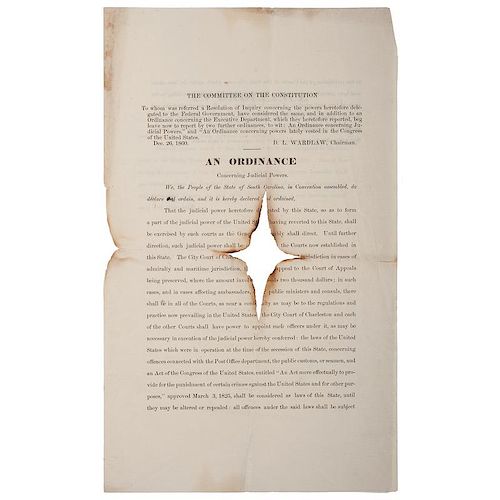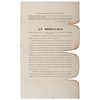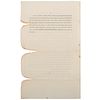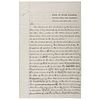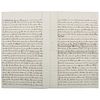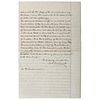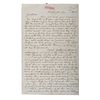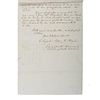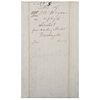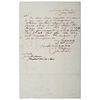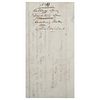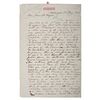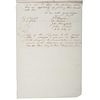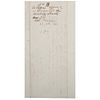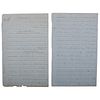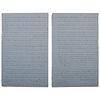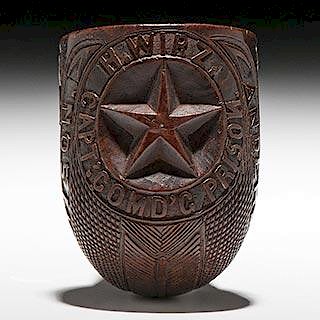Early Civil War Documents Related to South Carolina and Charleston on the Verge of War
About Seller
6270 Este Ave.
Cincinnati , OH 45232
United States
With offices in Cincinnati, Cleveland and Denver, Cowan’s holds over 40 auctions each year, with annual sales exceeding $16M. We reach buyers around the globe, and take pride in our reputation for integrity, customer service and great results. A full-service house, Cowan’s Auctions specializes in Am...Read more
Two ways to bid:
- Leave a max absentee bid and the platform will bid on your behalf up to your maximum bid during the live auction.
- Bid live during the auction and your bids will be submitted real-time to the auctioneer.
Bid Increments
| Price | Bid Increment |
|---|---|
| $0 | $25 |
| $500 | $50 |
| $1,000 | $100 |
| $2,000 | $250 |
| $5,000 | $500 |
| $10,000 | $1,000 |
| $20,000 | $2,500 |
| $50,000 | $5,000 |
| $100,000 | $10,000 |
About Auction
Feb 21, 2017 - Feb 22, 2017
Cowan's Auctions dawnie@cowans.com
- Lot Description
Lot of 7 official, clerical retained copies of correspondence and instructions relating to the secession of South Carolina, the crisis at Fort Sumter, and eventually the price for the conflict paid by the city of Charleston. The state owned copies of these can be turned up through online searches. These examples were probably retained as personal copies by one of the many officials involved in the early movement for secession in South Carolina and likely came north as war souvenirs.
With Lincoln’s election in November 1860, South Carolina secessionists went into overdrive, and six weeks later a state convention passed an ordinance of secession claiming the dissolution of the Union, and in accordance with that determination state officials decided to open negotiations with Washington for the transfer of Federal facilities within their borders. Major Anderson, in charge of Federal troops at Charleston, moved his men to Fort Sumter in late December, but instead of pulling out, the Federal government sent reinforcements and supplies on the USS Star of the West, which was fired on by state forces on January 9, 1861. Negotiations were then halted and the governor demanded Anderson surrender two days later. Anderson declined, but agreed that envoys would go to Washington to try to straighten things out. South Carolina Governor Pickens then sent Attorney-General Isaac W. Hayne as the envoy to meet with (still) President Buchanan and demand the fort. The lot contains a cover letter dated Senate Chamber, January 10th (or 11th), 1861. Addressed to President Buchanan, it is signed by three senators, Ben. Fitzpatrick, S.R.(Stephen) Mallory, and John Slidell. We have been requested to present to you copies of a correspondence between certain Senators of the United and Col. Isaac W. Hayne now in this city on behalf of the government of South Carolina and to ask that you will take into consideration the subject of said correspondence.
Isaac William Hayne (1809-1880) was the state attorney-general and had been the man who officially read out the ordinance of secession. A member of a prominent South Carolina family, among his relatives was Robert Y. Hayne, senator and governor, who engaged in a famous debate with Daniel Webster in 1830, and was active in the nullification convention in South Carolina in 1832. Isaac Hayne was admitted to the bar in 1831 and after practicing law for a time in Alabama, returned to South Carolina in 1848 and was elected repeatedly to the office of attorney general (an office Robert Y. Hayne had also held), a post he held continuously from 1848 to 1868.
On January 15 several senators from other states that had seceded or were on the verge of doing so (among the visitors were Jefferson Davis and Judah Benjamin) asked Hayne to delay delivering his demand to the President, assuring him and the governor of South Carolina that the arrival of the Star of the West was not an attack on the state and suggesting that negotiations might still resolve the question of Federal facilities. They advised delay at least until February 15, by which time they expected their own states would meet in convention with South Carolina and form a “new Confederation and Provisional government.” They hoped the delay would allow for, “calm and deliberate” counsel, and that together they might come to some “wise just and peaceable solution of existing difficulties.” They must have been also worried that South Carolina might provoke outright war prematurely. We offer Hayne’s response to this letter from the senators of seceded states, dated January, 1861, but probably January 17, given a subsequent reference in another document. In our letter Hayne acknowledges the senators’ letter and its contents: that your people feel they have a common destiny with our people, and expect to form with them in that Convention a new Confederacy and Provisional Government; that you must, and will share our fortunes, suffering with us the evils of war, if it cannot be avoided, and enjoying with us the blessings of peace, if it can be preserved. Hayne then agrees to delay delivering the demand until he can hear from the governor and assures them that the state has not cut off Anderson and Fort Sumter from essential supplies and communications. 2pp, in ink, tied at top with red tape/ribbon. Docketed on reverse.
Shortly after the above exchange, President Buchanan addressed a letter to the senators through Secretary of War Holt to buy time, maintaining that his actions so far had been without any hostile or unfriendly purpose to South Carolina, but simply to protect and preserve US public property and that while he could not promise no further reinforcements would be sent to Sumter or any act of hostility would take place, since the power to wage war rested with Congress, he did not deem it necessary at the moment to reinforce Anderson.
A copy of the follow-up letter sent to Hayne by the senators of seceding states who still remained at Washington, dated January 23, 1861, just days after his arrival in the city is also included. 2pp, in ink, bound at top by red tape. Docketed reverse: No 12 Letter of Senators of Seceding States to I.W. Hayne 23 Jan. 1861 Copy. In this letter, the senators who had asked Hayne to delay delivering his demand to the President enclose the letter from the secretary of war (not included with this.) Altho’ its terms are not as satisfactory as we could have desired in relation to the Ulterior purposes of the Executive, we have no hesitation in expressing our entire confidence that no reinforcements will be set to Fort Sumter, nor will the public peace be disturbed within the period requisite for full communication between yourself and your government ... They therefore again ask Hayne to delay delivering his demand and express the hope that, South Carolina will not deem it incompatible with her safety, dignity or Honor to refrain from initializing any hostilities against any power whatsoever or from taking any steps tending to produce collision until our States which are to share her fortunes shall have an opportunity of joining their counsels with hers. The letter was then signed by seven of the senators who had signed the earlier letter, with a note that the others had returned to their respective states. Needless to say, these attempts to avoid a conflict failed. Hayne finally presented his demand for Fort Sumter to the President on February 6, a provisional constitution for the Confederacy was adopted February 8, Jefferson Davis was elected provisional President the next day, and war would now decide whether there existed one country or two.
Accompanied by a letter from South Carolina Secretary of State McGrath to the Governor on March 24, 1861, outlining recent actions taken in the state’s Executive Council. Pre-printed heading of Executive Office, State Department, Charleston, with filled in date of 24 March, 1861. 4pp, in ink. Interlineations, additions, and deletions indicate this may be the original draft of the communication in McGrath’s hand. The letter refers to several enclosures, not with it, but deals with Fort Sumter, the crisis provoked by the Star of the West, and Isaac Hayne’s mission. Additional reference is made to the secession of Florida and its commissioner’s appeal for aid, and lastly to the issue of recognition of South Carolina by foreign powers after its secession but before the formation of the Confederacy, an issue that had come up with the appointment of a new Spanish Consul and the determination of the governor not to allow him to take up his post (at Charleston, we presume) unless he presented his credentials to be recognized by the Governor. That matter had since been referred to as the new Confederate Department of State in Montgomery.
This presents another interesting insight into South Carolina affairs in late 1860 and early 1861, when the state was considering its own status as a sovereign nation and the brief period between its secession from the Union and joining the Confederacy. Interestingly, McGrath as a judge was interested in limiting not only Federal power, but also the power of the central Confederate government, an interesting problem in the midst of a war.
Two printed proclamations included in this lot also relate to the status of South Carolina in this early period. Both are singed, the first along the right edge, the second in the center. The consignor suggests this happened when Charleston burned in December 1861 (over 600 buildings were damaged in the 160+ acre fire).
The first is An Ordinance to amend the Constitution of the State of South Carolina, in respect to the Executive Department. Only the first of two pages, 8.25 x 13.75 in. (not in Parrish & Willingham) This Ordinance allows the Governor to receive ambassadors, and other agents from foreign powers, a function previously held by the Federal government. According to the Journal of the Convention, this was passed at Charleston, December 27, 1860.
The second proclamation is An Ordinance Concerning Judicial Powers. The form cited in the Journal of the Convention is but one short paragraph (the equivalent of the first four lines of the one offered here). The short form is also likely the one recognized by Parrish & Willingham (3783). This version is considerably longer and was originally two pages, the second page now missing. The one cited by Parrish & Willingham was passed on December 26, 1860. This version, however, gives The City Court of Charleston [missing text] jurisdiction in cases of admiralty and maritime jurisdiction, [missing] appeal to the Court of Appeals being preserved, where the amount involv[ed exc]eeds two thousand dollars; in such cases, and in cases affecting ambassadors,,,, [missing] public ministers and consuls, there shall be in all of the Courts, as near a conf[orm]ity as may be to the regulations and practice now prevailing in the United States, ...: the laws of the United States which were in operation at the time of the secession of this State, concerning offences connected with the Post Office department, the public customs, or seamen, ... approved March 3, 1825, shall be considered as laws of this State, until they may be altered or repealed:... Clearly this was a "stop-gap" ordinance that was likely in effect only a short time until the Constitutional Convention passed the new Confederate Constitution and its own laws.
A Proclamation by South Carolina Governor Milledge L. Bonham is also included, in which he orders the evacuation of non-combatants from Charleston, dated August 17, 1863: Whereas Charleston is beleaguered by our foe with a powerful land & naval force requiring us to put forth every energy and to submit to every sacrifice that the good of our cause may demand… Bonham (1813-1890) was former US Army officer who had served in the Seminole and Mexican Wars. His older brother, James Butler Bonham, died at the Alamo. Milledge Bonham served in the South Carolina militia, as a state representative, and as a member of congress, where he replaced his cousin, Preston Brooks, who had famously caned Charles Sumner. Bonham was a commissioner from South Carolina to the secession convention in Mississippi and eventually a brigadier general in the Confederate Army. He returned to politics to be elected governor by the South Carolina General Assembly in late 1862 and served until late 1864, when he went back to military duty. A state convention in January, 1863, had decided Charleston should be defended at all costs - they would..."prefer a repulse of the enemy with the entire city in ruins to an evacuation or surrender on any terms whatever"… and appointed a commission to supervise the evacuation of non-combatants, “negroes & other property,” when they thought it necessary. In July the commanding General had advised the evacuation take place, but not much had been done about it. Bonham therefore published this proclamation recommending and enjoining upon all good citizens to undertake the evacuation and the appointed commissioners to use their powers to enforce it if necessary. As with the McGrath letter in this group, handwritten corrections, deletions and additions indicate we are close to the original manuscript of this proclamation.
Provenance: Property of Another Owner - Shipping Info
-
SHIPPING. At the request of the buyer, Cowan's will authorize the shipment of purchased items. Shipments usually occur within two weeks after payment has been received. Shipment is generally made via UPS Ground service. Unless buyer gives special instructions, the shipping method shall be at the sole discretion of Cowan's Auctions, Inc.. Cowan's is in no way responsible for the acts or omissions of independent handlers, packers or shippers of purchased items or for any loss, damage or delay from the packing or shipping of any property.
-
- Buyer's Premium



 EUR
EUR CAD
CAD AUD
AUD GBP
GBP MXN
MXN HKD
HKD CNY
CNY MYR
MYR SEK
SEK SGD
SGD CHF
CHF THB
THB